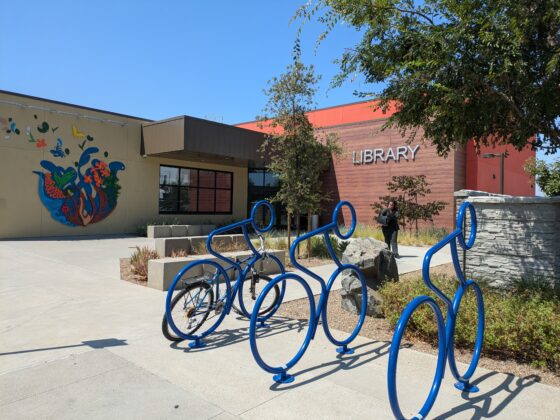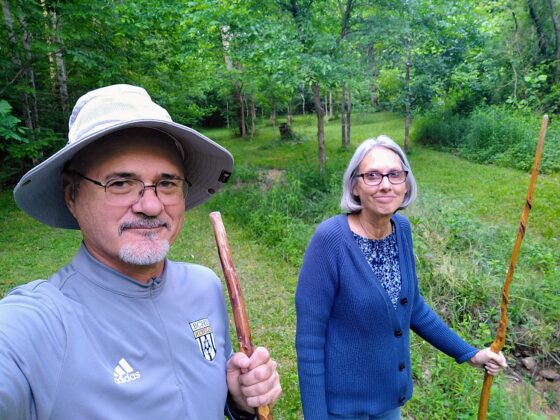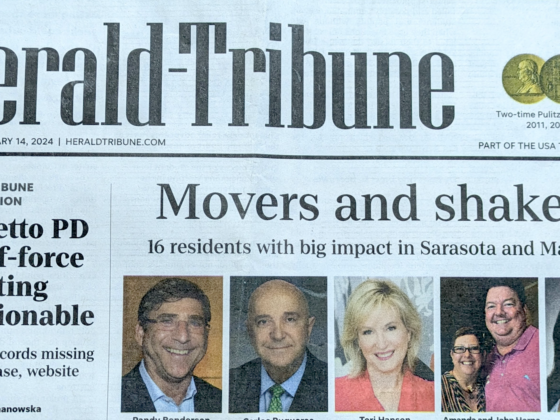In the wake of the shocking and brutal knife attack on the main stage of the Chautauqua Institution yesterday, the world’s attention is naturally and properly directed toward Salman Rushdie. He has spent most of his adult life under the threat of murder ordered by fatwa; he has never stopped writing and has dared to re-appear in public; he has been one of world’s best-known exemplars of what “courage of one’s convictions” can mean. Now the world is reminded of what he had to fear all along.
The two of us know Salman Rushdie only through his work, but we join the widespread horror at what he has endured and admiration for what he represents.
We know in a different way the other person who was stabbed yesterday, and the place where the assault occurred. We want to say a few words about each of them.
Henry Reese was preparing to lead an on-stage discussion with Salman Rushdie yesterday, when the attacker stormed up from the audience and began stabbing them. We understand that Henry was injured, with a wound that just missed his eye, as he attempted to block the attacker.

There could hardly have been a better-suited person to lead this discussion than Henry Reese, which is of course why Chautauqua had selected him. Over the past two decades, he and his wife, Diane Samuels, have led Pittsburgh’s “City of Asylum,” which has been devoted to providing protection, support, and a base for artists who have been persecuted for their views. Salman Rushdie’s experience and personal guidance have been important parts of their effort.

You can read the City of Asylum’s account of Rushdie’s role in its creation from its own website, here. After the first of our many trips to visit them back in 2014, Deb Fallows wrote about Reese, Samuels, their vision, and their work. From her article, which mentioned the roles both of Rushdie and of an exiled Chinese artist named Huang Xiang:
There are Cities of Asylum all around the world, founded about 20 years [in the 1990s] ago to provide sanctuary for exiled at-risk writers. A couple from Pittsburgh, Henry Reese and Diane Samuels, happened to hear Salman Rushdie speak in town. When he happened to mention the Cities of Asylum in Europe, they were interested. To say “interested” is an understatement.
For six years, Reese and Samuels asked the network in Europe to let them create a Pittsburgh City of Asylum. One day they got a call back: yes. The Pittsburgh agreement would be unusual, as other centers were organized with institutional sponsorship, mostly universities. Pittsburgh, as a community, would go it alone. Reese, who had run successful businesses involving coupon books, telemarketing, and call centers, and Samuels, who is a visual artist, pulled together a group of friends and donors to give it a try for two years. They would need to raise money to provide housing, medical benefits, a living stipend for the writer.
They bought a former crack house on a small lane called Sampsonia Way and fixed it up. The lane feels like a Midwest version of a hutong in old Beijing. It sits in the close-in north side section of Pittsburgh known as the Mexican War Streets (with street names from battles and generals from the Mexican American War), a kind of gentrified Bohemian row-house neighborhood with many writers, artists, eclectic personalities and interesting people. Reese and Samuels live there, too…
Huang Xiang and his wife, Zhang Ling, arrived. Then the magic began to happen. No one had any rules for how this was supposed to work, so they all learned from one another.
Huang Xiang was full of ideas and energy. As Reese describes it, Huang was fairly bursting to let loose with all that had been pent up for so many years. Huang didn’t just recite a poem, he danced, shouted, waved, and lived that poem with his entire body and spirit. He was a master of performance…
Reese’s and Samuels’s default was to say yes to everything. When Huang saw Pittsburgh’s Mt. Washington and said he’d like to carve a poem into the mountain, in the tradition of Chinese poets, Samuels didn’t blanch but suggested he might paint his poems on the outside of his house instead. So they set up scaffolding around the frame house and Huang went to work, painting his poems in his own “grass style” calligraphy. He was “writing his house” as they now describe it.
People could not help but notice House Poem. Before long, neighbors who didn’t even understand a word of Huang’s Chinese poetry, began to slip notes through the mail slot, with poems they had written themselves.
There is much more in Deb’s account, which is all the more relevant in the wake of this shocking news. Among her conclusions:
“I finally understood that the City of Asylum is about more than giving an exiled writer a place to live and work. It is about building a community around them that participates with the poetry, or art, or music that is being created in that living space.”
Two other reports on the City of Asylum are “A River of Words in Pittsburgh,” and “Language as Art in Pittsburgh.” In 2016 our colleague Ben Speggen wrote in the Erie Reader about what the City of Asylum had meant to its community. These too have additional relevance.
As does the quote that has headlined the City of Asylum’s website since long before this tragedy:

So far no one has died from this attack, though Rushdie’s condition was originally reported as “critical,” and the wounds of all sorts are profound. We dare begin to reflect on what might have happened if the weapon were not a knife but a high-capacity, rapid-fire weapon of destruction. All the objects of this attack have stood for courage and freedom of expression. Their examples and influence will always live, and we hope their own work becomes all the stronger.
The other object of attack was the Chautauqua Institution itself. This is a magical physical space, and an enduring example of the best in life at all levels: individual commitment and values, family connections and tradition, community possibilities, goals that transcend boundaries of race and faith and gender and politics.
We feel ourselves very fortunate to be part of the extended Chautauqua family. We have been there many times over the decades, starting when our children were little in the 1980s and extending to the immediate pre-pandemic years. Three years ago Jim emceed a weeklong series of afternoon discussions, in Chautauqua’s glorious, open-air Hall of Philosophy, including people we’d met in the Our Towns travels. We’ve had the honor of speaking on the main amphitheater stage where yesterday’s attack occurred, and in chairs like those where Rushdie and Reese were seated. We’ve made memories and friendships that endure.
We know how significant the atmosphere of trust, informality, person-to-person contact, and casual conversation and connection is to Chautauqua’s lasting imprint – and therefore how deeply shocking this act of violence was.
There is no better way to express what Chautauqua has stood for, and will stand for, than to hear the powerful brief message that its president, our friend Michael Hill, delivered to a Chautauqua community vigil last night, from the stage of the Hall of Philosophy.
Eloquence and profundity, in times of grief, are rare rhetorical achievements. Michael Hill was eloquent and profound. For our own reference purposes we have made a transcript, attached below. But for the full effect we hope you will listen to him speak through these four minutes here:
Bear Salman Rushdie in your thoughts. And Henry Reese and the full City of Asylum family. Their courage to stand up and speak up should give the rest of us confidence, and an example. The truth must be spoken.
And bear in mind the example set by the whole Chautauqua community, and all the others doing their best to become even stronger after yesterday’s wounds.
APPENDIX: Michael Hill’s remarks.
Below is a transcript, produced by Otter.ai, of Michael Hill’s remarks at the Chautauqua community vigil on August 12, the day of the stabbing. Michael Hill also put out a statement today.
From his remarks on the day of the attack:
Chautauqua is a community of people of all faiths and none.
And so I want to begin tonight by sharing that our collective family is holding Mr. Rushdie and Mr. Reese as well as their families close in prayer. We’ve been in touch with their families throughout the day and was grateful to be able to spend a bit of time with Mr. Reese this evening, who’s out of the hospital and is doing well.
What we experienced at Chautauqua today is unlike anything in our 150-year history. It was an act of violence, an act of hatred and a violation of the one thing that we have always cherished most, the safety and the tranquility of our grounds and our ability to convene any conversation, even if it’s difficult.
But today was also an attack on an ideal we cherish at Chautauqua — that freedom of speech and freedom of expression are hallmarks to our society and to our democracy. And they’re the very underpinnings of who we are and what we believe, and what we cherish the most.
Tonight, we’re called to take on fear, and the worst of all human traits, hate. And let’s be clear, what many of us witnessed today was a violent expression of hate that shook us to our core. We saw with our own eyes and we saw it with our own faces.
But we also saw something else today that I hope we never forget.
We saw some of the best of humanity in response to the numbers of people who ran toward danger.
I watched a member of our staff hurl themselves at the attacker. I saw Chautauquans rush the stage to help secure the perpetrator, making it possible for the police to remove him. And Chautauquans who are doctors and nurses rushed to provide selfless care, literally holding Salman Rushdie together until the ambulance arrived. We saw what our chaplain this week called us to possess, a generous radical love for each other and for this community.
So where do we go from here? How do we think about tomorrow and the days that follow? When hatred shows its ugliness in our home, and on our stages and in our gathering places?
We know the response has to be love, but it also has to be action. We will return to our podiums in our pulpits. We will continue to convene those conversations that were tried to be stopped today so that we can build greater empathy. And it’s more important now than ever.
There will be time in the days and weeks ahead to reflect on all we’ve experienced today. And we’ve all been working most of today on how to adapt to today’s horrors. To ensure our conversations and community continuing.
But tonight, we’re simply called to be with one another. We’re called to sing sacred songs and sit in silence.
We’re called to hug our neighbor and hold a hand we’re called to double down on our prayers for Mr. Rushdie and Mr. Reese, and everyone that loves them.
And we’re called to stand witness that this Chautauqua really only has one choice: To ensure that the voices that have the power to change our world continue to have a home in which to be heard.
That’s what’s ours to do.
So tonight, we can take the experience of hatred and reflect on what it means for today. Or we can come together even more strongly as a community who takes what happens today and commits to not allowing that hatred to have any room in our hearts.
I know this community. I saw it run toward danger. I saw it make the choice for hope.
I know that’s what we’ll do tonight and starting tomorrow.
God bless you all.

![Historical view of the Amphitheater at the Chautauqua Institution in New York, scene of Friday, Aug. 12's attack on Salman Rushdie. [Image from New York Public Library via Wikimedia Commons.]](https://www.ourtownsfoundation.org/wp-content/uploads/2022/08/Section_of_Amphitheater_Chautauqua_Institution_Chautauqua_New_York_NYPL_b12647398-79479.jpg)


